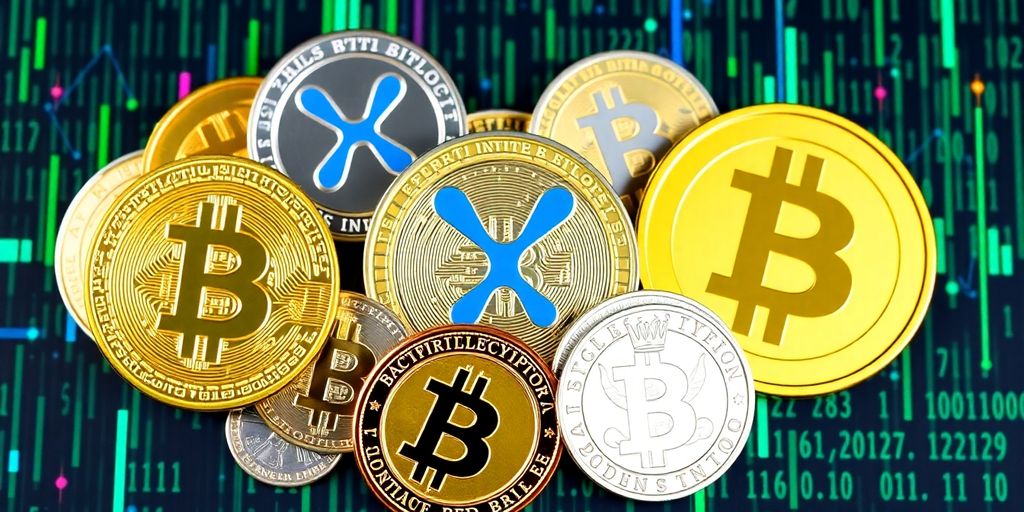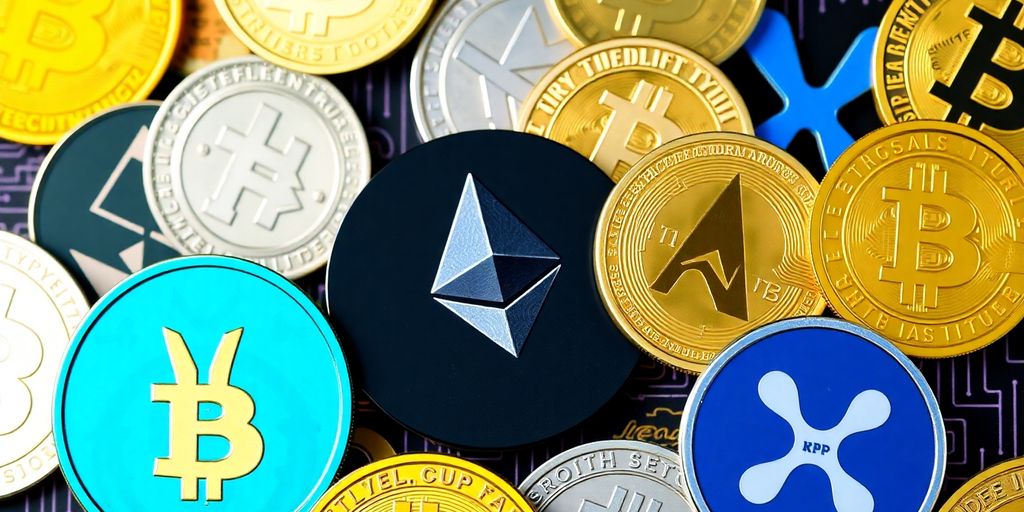Cryptocurrencies have become a hot topic in recent years, and understanding the key terms related to them is essential. From Bitcoin, the first and most famous cryptocurrency, to XRP, a digital asset designed for fast transactions, this article will help you grasp the basics of these digital currencies and their underlying technology. Let’s explore the important concepts that connect Bitcoin to XRP and what they mean for users and investors alike.
Key Takeaways
- Bitcoin is the first cryptocurrency and is often seen as a digital gold.
- XRP is designed for quick and cheap transactions, making it ideal for banks and payment systems.
- Both Bitcoin and XRP use blockchain technology, but they serve different purposes.
- Bitcoin is limited to 21 million coins, while XRP has a total supply of 100 billion.
- Understanding the differences between Bitcoin and XRP can help investors make informed decisions.
Understanding Cryptocurrency Basics

What Is Cryptocurrency?
Cryptocurrency is a type of digital currency that operates without a central authority. It is a class of digital assets, including Bitcoin and Ethereum, that runs on decentralized networks. This means that transactions are verified by a network of computers rather than a single entity. Cryptocurrency allows for greater financial freedom and control over personal assets.
The Role of Blockchain Technology
Blockchain technology is the backbone of cryptocurrencies. It is a secure and transparent way to record transactions. Here are some key points about blockchain:
- Decentralization: No single entity controls the blockchain.
- Transparency: All transactions are visible to everyone on the network.
- Security: Cryptographic techniques protect the data.
How Cryptocurrencies Are Used
Cryptocurrencies can be used in various ways, including:
- Purchasing goods and services: Many online retailers accept cryptocurrencies as payment.
- Investment: People buy cryptocurrencies hoping their value will increase over time.
- Remittances: Cryptocurrencies can be used to send money across borders quickly and with lower fees.
In summary, understanding cryptocurrency basics is essential for navigating the evolving financial landscape. By grasping these concepts, we can better appreciate the potential of digital currencies and their impact on our economy.
Bitcoin: The Pioneer of Digital Currency

History and Evolution of Bitcoin
Bitcoin is often seen as the first decentralized digital currency. It was created in response to the 2008 global financial crisis, aiming to provide a new way of handling money without relying on banks. Over the years, Bitcoin has evolved significantly, gaining popularity and acceptance worldwide.
How Bitcoin Works
Bitcoin operates on a technology called blockchain, which is like a public ledger that records all transactions. This system ensures that transactions are secure and transparent. Here’s how it works:
- Transaction Initiation: A user initiates a transaction.
- Verification: Miners verify the transaction using complex algorithms.
- Recording: Once verified, the transaction is added to the blockchain.
- Completion: The transaction is complete, and the user receives confirmation.
The Impact of Bitcoin on the Financial System
Bitcoin has had a profound impact on the financial system. It has introduced new concepts such as:
- Decentralization: Reducing reliance on traditional banks.
- Volatility: Prices can fluctuate wildly, attracting both investors and speculators.
- Innovation: Sparked the creation of thousands of other cryptocurrencies.
Bitcoin has changed how we think about money and transactions, paving the way for a new financial landscape.
In summary, Bitcoin’s journey from a niche digital currency to a mainstream financial asset is a testament to its revolutionary potential. As we explore further, we will see how it compares to other cryptocurrencies like XRP.
XRP and the XRP Ledger Explained

What Is XRP?
XRP is the native cryptocurrency of the XRP Ledger, a decentralized platform that was launched in 2012. It is designed to facilitate fast and low-cost transactions across different currencies. Unlike Bitcoin, which relies on mining, XRP transactions are confirmed in just a few seconds, making it a popular choice for financial institutions and individuals alike.
The Functionality of the XRP Ledger
The XRP Ledger (XRPL) is a unique blockchain that allows users to issue, transfer, and trade digital assets. Here are some key features of the XRPL:
- Decentralized: The XRPL operates without a central authority, ensuring transparency and security.
- Fast Transactions: Transactions are typically processed within 3 to 5 seconds.
- Low Fees: Instead of high transaction fees, users pay a small amount of XRP, which is burned by the network.
| Feature | XRP Ledger | Bitcoin |
|---|---|---|
| Transaction Speed | 3-5 seconds | 10 minutes to hours |
| Transaction Fee | 0.00001 XRP | Varies (up to $128) |
| Consensus Mechanism | XRPL Consensus Protocol | Proof of Work |
Advantages of Using XRP for Transactions
Using XRP for transactions offers several advantages:
- Speed: Near-instant transaction confirmations.
- Cost-Effectiveness: Minimal fees compared to traditional banking systems.
- Scalability: The XRPL can handle a large number of transactions simultaneously.
The XRP Ledger is a game-changer in the world of digital finance, providing a secure and efficient way to conduct transactions.
In summary, XRP and the XRP Ledger represent a significant advancement in cryptocurrency technology, offering unique benefits that cater to the needs of modern financial systems.
Comparing Bitcoin and XRP

Key Differences Between Bitcoin and XRP
When we look at Bitcoin and XRP, we see two cryptocurrencies that serve different purposes. Here are some key differences:
- Transaction Speed: XRP transactions are confirmed in about 3 to 5 seconds, while Bitcoin can take 10 minutes to several hours.
- Transaction Costs: XRP has minimal fees, as users only pay a small amount of XRP that gets burned. In contrast, Bitcoin fees can be much higher, sometimes reaching over $100.
- Supply: Bitcoin has a maximum supply of 21 million coins, while XRP has a total supply of 100 billion coins, with a significant portion held by Ripple.
Use Cases for Bitcoin vs. XRP
Both cryptocurrencies have unique use cases:
- Bitcoin is often seen as a store of value, similar to digital gold.
- XRP is designed for fast and cheap cross-border payments, making it appealing for banks and financial institutions.
- Investment: Many investors view Bitcoin as a long-term investment, while XRP is often used for quick transactions.
Future Outlook for Bitcoin and XRP
The future of both cryptocurrencies is uncertain, but we can make some observations:
- Bitcoin continues to be the leader in market capitalization and is widely recognized.
- XRP has potential for growth, especially if it gains more adoption in the financial sector.
- Market Dynamics: The cryptocurrency market is volatile, and changes can happen quickly, affecting both Bitcoin and XRP.
In conclusion, while both Bitcoin and XRP are popular cryptocurrencies, they cater to different needs and preferences. Understanding these differences can help us make informed decisions about our investments and usage of these digital currencies.
Conclusion
In summary, understanding the world of cryptocurrencies like Bitcoin and XRP can seem overwhelming at first. However, by breaking down key terms and concepts, we can gain a clearer picture of how these digital currencies function. Bitcoin, known for its high value and popularity, serves mainly as a store of value, while XRP stands out for its speed and low transaction costs, making it ideal for international payments. As the crypto landscape continues to evolve, staying informed about these terms will help you navigate this exciting financial frontier with confidence.
Frequently Asked Questions
What is cryptocurrency?
Cryptocurrency is a type of digital money. Unlike regular money like dollars or euros, it is not controlled by banks or governments. It uses special technology called blockchain to keep track of transactions.
How does Bitcoin work?
Bitcoin works like digital cash. You can send it to someone else over the internet without needing a bank. It uses a network of computers to verify transactions and keep everything secure.
What is XRP?
XRP is a digital currency that is part of the XRP Ledger. It is designed to make money transfers faster and cheaper, especially for international payments.
What are the main differences between Bitcoin and XRP?
Bitcoin is mainly used as a store of value, while XRP is used for quick and low-cost transactions. Bitcoin takes longer to process transactions than XRP.
Can I use Bitcoin to buy things?
Yes, many places accept Bitcoin as payment. However, it is more often seen as an investment rather than a way to buy everyday items.
Is XRP a good investment?
Whether XRP is a good investment depends on your goals. It is popular for fast payments, but like all cryptocurrencies, it can be risky.
What is blockchain technology?
Blockchain technology is a secure way to record information. It is like a digital ledger that everyone can see and trust, making it hard to cheat or change the data.
How can I buy Bitcoin or XRP?
You can buy Bitcoin or XRP on cryptocurrency exchanges. You’ll need to create an account, link your bank account or credit card, and then you can start buying.





